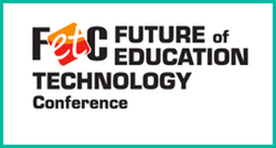
The highlights for FETC 2020 include two new content tracks designed to support tech coaches and library media specialists; partnerships with Future Ready, the National Association of ESports Coaches and Directors, and Kennesaw State University’s iTeach program; and keynotes from Daniel Pink and Justin Shaifer.
In these interviews, Jennifer Womble and Stephanee Stephens share information regarding many of the exciting new conference features and give you an idea of what to expect in Miami.
FETC is celebrating its 40th anniversary in 2020 and doing so in style: a move to a new location in Miami, combined with the introduction of new content partnerships to bring in esports content and sessions aligned with Future Ready pillars. The updates also include two new content tracks to meet the needs, respectively, of tech coaches and library media specialists. In this interview, FETC program chair Jennifer Womble previews some of the conference highlights.
"There's been a big movement in education to include more coaching,” she shares, explaining the decision to add the Future of Ed Tech Coach track. “We see instructional coaching, technology integration specialists, technology coaches, and reading coaches. And it's really exciting because, in education, mentors are making a big difference in student learning on campus and teachers can practice strategies."
Womble also previews the keynotes from Daniel Pink and Justin Shaifer. The challenge in choosing keynotes is finding speakers who can address the changing culture in education, speak about increased innovation, and offer useful feedback. Both of these presenters meet the requirements:
"Daniel Pink really was the perfect fit because he talks a lot about human behavior and has done the research and brings a lot of that research to site. Whether you're an administrator, educator or coach, there are pieces of all of his books that can be employed in education to boost student performance, give better feedback, improve motivation, curiosity, and autonomy."
And when it comes to Shaifer, "He taps into what's happening with young people and helps those in education reflect on what happens inside the classroom that builds curiosity. [He understands] how to engage students and the way STEM propels all students into future careers."
An Innovative Collaboration to Power Up Professional Growth
Stephanee Stephens is the Director of iTeach, a team of educational coaches who are part of the Bagwell College of Education at Kennesaw State University in Georgia. She and her team have partnered with FETC to create the FETC Coaching Collaborative Powered by iTeach, which gives tech coaches the opportunity to receive a new certification for their professional learning. Together, the partners are working with the next generation of education technology professionals to support transformative leadership in the edtech ecosystem.
"We piloted and spoke to conference attendees last year and helped inform them that we were going to build by the people who would support and make an impact. As an educator, leader, developer, and designer, those are all the things that you want to be able to create in a partnership. FETC and LRP have just been phenomenal to work with."
By latching onto a microlearning, micro-goal philosophy, and leveraging research-based approaches to motivation, Stephens is excited about providing a professional learning experience that she describes as both "holistic and year-round."
The development of the training started through discussions with Dr. Robert Avossa and other senior staff at LRP to prioritize the feedback collected with people who had attended the conference. Stephens and her team asked attendees, "What are the explicit things you need to develop for yourself within this role?" Then they went back to research and apply the information to already embedded professional learning knowledge.
As a result, four modules were created on several topics relative to coaching and edtech. Stephens wanted the learning to have a certain freedom that was "bite-sized, manageable, and personalized in nature." She promoted space for a type of training that would create individualized evidence of mastery. Listen to the interview to learn more.
Visit edCircuit for more interviews with more FETC 2020 presenters












